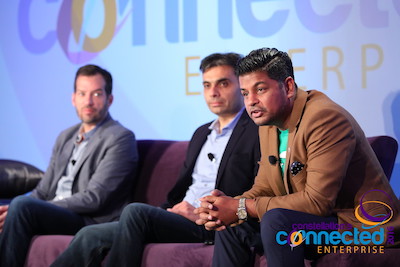
Blockchain was a featured topic of discussion on the opening day of Constellation Research's Connected Enterprise 2016 event, with expert panelists exchanging perspectives on whether it has moved beyond the hype phase.
“[The blockchain market] looks like what the cloud looked like 10 years back," said panelist Chirag Mehta, a longtime cloud and big data executive. "There is startup hype and people are trying to figure out what’s real and what’s not.”
 “Blockchain as a concept has been around for many, many years," Mehta noted. The rise of Bitcoin as an instantiation of blockchain technology was a good thing for blockchain's evolution, he added. "Everybody noticed because now there was money behind it.”
“Blockchain as a concept has been around for many, many years," Mehta noted. The rise of Bitcoin as an instantiation of blockchain technology was a good thing for blockchain's evolution, he added. "Everybody noticed because now there was money behind it.”
Not only is there plenty of substance beyond the blockchain hype, "I think it’s the biggest thing I’ll ever see in my life," said Richie Etwaru, chief digital officer at IMS Health.
“Blockchain is a style of thinking, a way of thinking how you can create networks to leverage trust more effectively," Etwaru said. "[To date], we built companies assuming that all counter-parties would be distrustful. Recognize it’s not a technology, it’s a protocol. The last time we saw something like this we saw [the creation] of sovereignty, governments and corporations.”
On an industry basis, blockchain technologies have probably gained the most traction in financial services. Health care is a vertical ripe for disruption given the difficulties it has with trust and privacy issues, Etwaru said.
But the problem for most companies is figuring out how blockchain applies to their business, said Mike Kail, founder of cybersecurity startup Cybric and a former CIO at Yahoo and Netflix.
“It’s very difficult with every new technology to separate the hype from noise. You really have to partner with someone," Kail said. "It's much like with cloud 10 years ago. People didn’t know how to move to cloud. Now we’re starting with blockchain: How does it apply to me?”
The best thing for companies can immediately do to develop a blockchain strategy is to figure out a focused use case, such as supply chain, and then work with a partner to develop it, Kail added.
Also, think philosophically, Etwaru said: "Start with an assumption: What if you had an abundance of trust? How would you build businesses differently? That’s where you find the use cases.”


